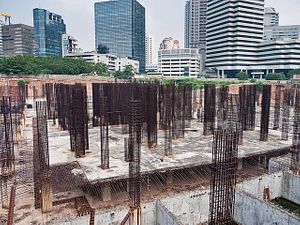Over the past several years, Indonesia has exerted efforts and resources on improving its infrastructure; this has been part of a major program highlighted by President Joko “Jokowi” Widodo in his national development agenda, known as Nawa Cita. This year alone, Jokowi planned to allocate $30.23 billion for infrastructure development. Despite this interest and investment, a problem has emerged which stakeholders involved in the booming infrastructure projects in Indonesia should pay attention to.
The Ministry of Public Works and Public Housing (PUPR) reported ten work accidents in the span of only six months, including the falling of a girder in the Pemalang-Batang highway project, the collapse of a girder at the Pasuruan-Probolinggo toll road construction, and the collapse of the bridge at the Bogor-Ciawi-Sukabumi highway construction in Bogor. Even the Social Security Management Agency (BPJS) noted that work accidents in construction projects increased by 10 percent during 2017.
With increasing infrastructure projects and plans in the country, the growing number of accidents should serve as a warning to the government and partners to take care in evaluating projects, starting in the design phase and carrying through the implementation and maintenance phases.
In general, occupational accidents or structural failures in the construction phase are mostly caused by a lack of discipline on the part of workers. The desire to speed up projects is one of the reasons why certain stages are passed without adequate care. According to Handbook of Occupational Health and Safety, construction safety is measured by the compliance of project implementers toward various stages, starting at planning and continuing through the entire life cycle of project. The design must be equipped with quality assurance in the method of implementation, proper work equipment and materials that comply with safety standards. The contractor selected in the bidding process is responsible for safety and preventing accidents — thus reviewing a company’s history of safety should be part of selecting a contractor. The next stage is the implementation stage with zero accidents. In this case, efforts are necessary to supervise standard operating procedures, work equipment and materials used. In the last stage, inspections are critical to assessing the project’s safe completion.
In the case of post-construction, structural failure is more often due to designs that have not undergone sufficient examination by competent experts. Although the establishment of the Building Reliability Advisory Team (TPKB) is a good step to not only examining the design of buildings, but also on strategic and high risk structures. However, the TPKB is currently only established in Jakarta and Tangerang, and non-existent in other cities, including those where there is an increasing number of infrastructure projects.
Post-construction structural failures can also be understood as a result of unequal competence in the areas of both structural and geotechnical skills. The enforcement of expert certification requirements is also far from ideal. Many skill certificates are issued without going through the correct competency examinations. The government has paid very little attention on the importance of standard competency certification rules among those who are involved in the construction projects.
The establishment of the National Construction Safety Committee (KNKK) at the PUPR mimics the model of the National Transportation Safety Committee (KNKT) that was established by the Ministry of Transportation. The only clear difference is that the KNKK is mostly dominated by internal members of PUPR ministry and involves very few experts from outside the ministry. This is different from the KNKT which selects its members through open recruitment. To date, the KNKK remains not independent and forensic investigations of construction failures often involve individuals who have little knowledge on technical issues and thus cannot be conducted thoroughly.
In the end, the recent construction safety cases should provide wake up call to all stakeholders in infrastructure projects in Indonesia about the need to evaluate and enforce work safety and quality standards. The major task of improving the quality and safety aspects of construction in the country’s infrastructure projects is a common challenge for not only the government as infrastructure development becomes a national priority agenda of the Jokowi administration. It is inexcusable to sacrifice safety even for the development of a nation.
Muhammad Zulfikar Rakhmat is a Ph.D Candidate at the University of Manchester in the United Kingdom.

































